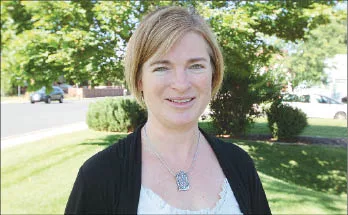
Home » Low vision rehab specialist calls for more collaboration
Low vision rehab specialist calls for more collaboration
Population of sufferers said to be growing, but simple steps can help

August 30, 2012
Years ago, Holly Galow's first client with low vision was a fiercely patriotic World War II veteran who became dispirited after an election ballot he had mailed in was rejected for having an illegitimate signature.
Galow, an occupational therapist who specializes in low-vision rehabilitation, says the man had been diagnosed with macular degeneration and couldn't see well enough to sign his name. He had his wife sign the ballot on his behalf, only to be rebuffed while exercising one of the basic rights he had fought to defend many years ago.
In that case, Galow, who works for the Gentiva Health Services Inc. home-health services office on Spokane's North Side, says she taught the client techniques that enabled him to see well enough to sign his name. Using the same technique, he could read a newspaper and stay abreast of politics as he had before his eyesight deteriorated.
A 20-year veteran of occupational training who has a master's degree in low vision rehabilitation, Galow says therapists, ophthalmologists, optometrists, and nonprofits that work with the blind need to collaborate more to serve this growing population.
Currently, the American Occupational Therapy Association says, 18 percent of senior citizens have low vision, and 30 percent of those 85 years old and older suffer from the condition.
As baby boomers age, Galow says, low vision is expected to become more common.
"This population is not going to be satisfied to sit in their rocking chairs and live out their days," she says.
Galow defines low vision as uncorrectable vision impairment that's severe enough to interfere with daily tasks, but with some usable range of vision still intact. She says, however, people who are diagnosed with the condition believe they are going blind and that little can be done about it.
"They tend to hang their hat up and say, 'I'm done,'" she says, adding, "It doesn't take much to get them re-engaged in what matters to them. That's what fuels my passion."
The most common causes of low vision are macular degeneration, glaucoma, or diabetic retinopathy, which is vision impairment caused by long-term diabetes. Each affects a different part of the eye and leaves usable vision elsewhere. For example, she says, macular degeneration affects direct vision, and most people who are diagnosed with that condition can see better if they simply shift their gaze slightly.
In addition to teaching certain techniques, Galow says she makes a number of changes to a person's home to make it easier to navigate. Most changes are simple, she says, such as putting a dark rug in front of a white toilet so it's easier to see where to sit, or putting black tape on knife handles in a drawer full of cooking utensils. Typically, she says, she also tries to improve the lighting in the home.
Low vision isn't synonymous with legal blindness, Galow says. Legal blindness is defined as corrected visual acuity of 20/200. That term, she says, was developed to describe the point at which people with poor eyesight, but who aren't dark blind, could qualify for certain federal benefits.
Latest News
Related Articles





